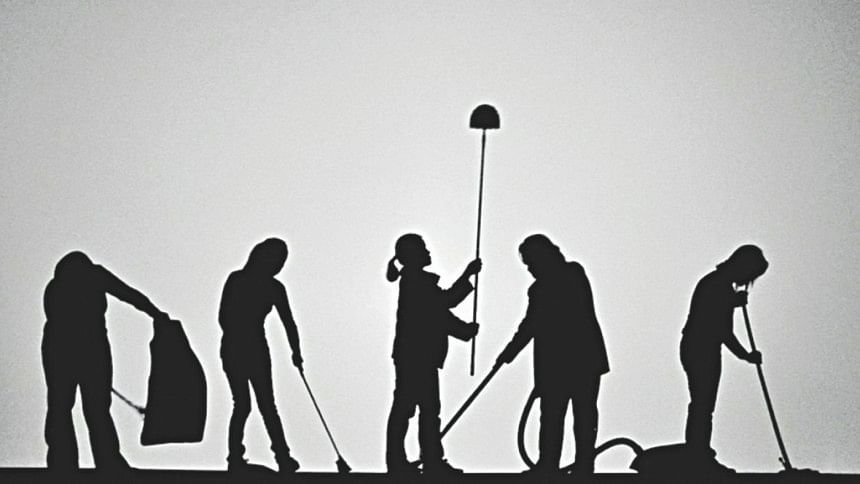Women migrant workers facing the continuum of exploitation

Ann Stewart is a Professor of Law at the University of Warwick. She researches and teaches in the area of gender and law with a particular interest in issues relating to development, human rights and global gender justice. Adib Shamsuddin from Law Desk talks to her on the issues of discrimination faced by the women migrant workers.
Law Desk (LD): How do you see the position of women in the context of international migration legal framework?
Ann Stewart (AS): That's not an easy question to answer, because women migrate in different ways, depending on a number of issues. For instance, if you come from a country which facilitates your professional skills, training and ultimately your migration, you tend to have a stronger bargaining position. Additionally, if you are migrating legally, in a documented way, to a country which has a strong human rights structure, labour regulatory framework, and then you are probably going to be fine. In the UK, nurses who have migrated to work for the NHS which is regarded as a good employer, find progress more difficult than nurses who have come from local background. But you can still face issues of discrimination even though you have migrated under quite formal advantage.

Primarily, women who migrate for work purposes are said to be migrating for survival, for the betterment of their own lives or their families. The extent to which they can do depends on where they end up, what conditions they are in and how much protection do they attract as workers in that country. The UK, for example, has good labour rights standards. If you migrate in a documented way and work in a regulated part of the economy, your rights are well protected. If you migrate to the Gulf States, for any contractual work and as a temporary migrant, you have few labour rights.
There are a lot of cross cutting issues that make life precarious for women labour. The majority of women are not skilled in conventional terms in the sense that they are more involved in the care giving services, and hence they often end up in the twilight zone of labour relations. For example, if you are a maid, there's seldom chance for you to be seen as a worker despite the International Labour Organisation has classified domestic work as work like any other work in Convention No. 189.
LD: What can we do to combat exploitation of women in cases of involuntary migration?
AS: I agree there is a continuum of exploitation. There are measures by the UN to combat organised crimes which includes measures to prevent trafficking, under the Palermo Agreement. Today it is recognised that these circumstances might be classified as modern day slavery. We are now acknowledging that slave-like conditions do continue to exist even in our modern times. There is now a lot of effort to put into to tackle these situations – what some call a 'rescue' industry. However, it is not clear that these efforts to combat trafficking have had much success. The mixed success comes from the fact that often the traffickers are found to be known to the victim, which muddles the situation. Also, personnel within the 'sending countries' seemed to have developed an expertise in trafficking since trafficking is the only way one can get out given the country's vulnerable economic position. The refugee crisis also spawns an industry of exploitation.
I don't think there is an easy solution until we improve the global infrastructures that produce the income gap that leads people to become involved in trafficking. Hence, until we tackle the profound income inequality between the 'sending state' and the 'receiving state' and the money that is made by getting around the fences that rich states put around their borders, we are not going to have an effective solution. You can try with law enforcement agencies, but it's not going to have a long lasting impact until we address the core issues.
LD: Workplace harassment or discrimination has been a big concern for labour rights activists. The existing labour laws perhaps were never meant to cater to the needs of women in workplace. Do you think the time has come for us to review our labour laws?
AS: As feminist legal scholars have pointed out, workplaces were crafted for men – as the ideal workers. Workplaces are public space and historically men have dominated the public sphere whereas women attended family or what many call the private sphere.
In the UK, research has shown that workplace harassment or discrimination is highest in sectors where women are just emerging as a potential workforce. It causes a power struggle in a sexualised form. And this is not for women only. Even one from the LGBT community, different from the norm of 'white male' worker in my country, is susceptible to discrimination in workplace.
There is a male entitlement supported by patriarchy. So the already fragile social norms preventing us from acting on our prejudices seem to break down. Women and the aforementioned groups find themselves vulnerable.
LD: What changes can we bring to combat exploitation and discrimination against women?
AS: Women's activism is stronger in some parts of the world than others. But there is importance in campaigns, political struggle and advocacy groups. There is a need to keep the pressure on. There is a role for social media to expose and to support political campaigns backed by any legal sanction or whatever is deemed necessary. There is a need to produce debate and organised solidarity to tackle these issues. But that's not always easy because not all the groups speak in a single voice.
Although I am a lawyer, I believe law supports politics not the other way around. They do go together, but as a feminist one has to participate in activism, make demands and expose what wrongs are going on. Only then can we ensure through law that the wrong doing is contrary to human rights and is a form of discrimination. There is also a need for the protection of those who come forward to report discrimination. I think a lot of things go hand in hand. States have responsibilities, so do the politicians to take these things seriously and mobilise public concern.
LD: Thank you for your time.
AS: You are welcome.

 For all latest news, follow The Daily Star's Google News channel.
For all latest news, follow The Daily Star's Google News channel. 



Comments